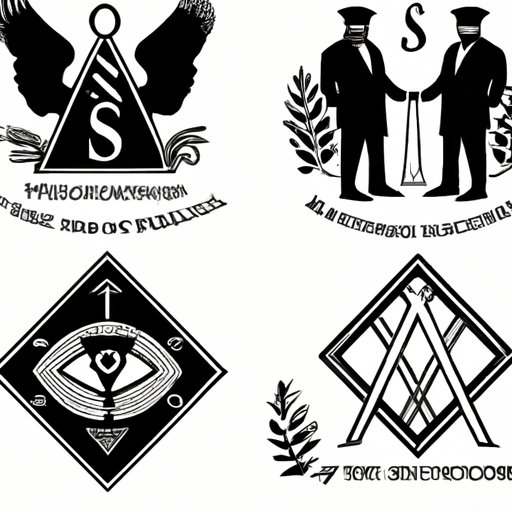
I. Introduction
Freemasonry is one of the world’s oldest and most secretive organizations. Its members have included presidents, religious leaders, and some of the most influential people throughout history. Despite this, few people truly understand what Freemasonry is, what its members believe, and what its purpose is. This article aims to provide a comprehensive overview of Freemasonry, from its principles and beliefs to its history, rituals, myths, and impact on society.
II. Unlocking the Door to Freemasonry: A Beginner’s Guide to the World’s Oldest Secret Society
At its core, Freemasonry is a fraternal organization that is dedicated to promoting moral and ethical values. Its members, who are known as Masons, come from a diverse range of backgrounds and professions, and they are united by their commitment to improving themselves and the world in which they live. One of the key tenets of Freemasonry is the belief in a Supreme Being, although members are not required to adhere to any particular religious faith or dogma.
Freemasonry is organized into local lodges, which in turn are governed by larger regional and national organizations. The highest-ranking member of each lodge is known as the Worshipful Master, and they are responsible for leading the group’s meetings and activities. Other members of the lodge hold different ranks, each with their own responsibilities and duties.
III. Unveiling the Myths: Separating Fact from Fiction about Freemasonry
Despite being a relatively benign organization with an emphasis on morality and ethics, Freemasonry has long been the target of conspiracy theories and myths. Some people believe that Freemasons are secretly controlling the world, or that they engage in satanic worship or other nefarious activities. These claims are entirely baseless and are not supported by any evidence. In reality, Freemasonry is a secular organization that is focused on personal growth and development.
Another common misconception about Freemasonry is that it is entirely shrouded in secrecy. While it is true that members of Freemasonry do not discuss their rituals or other internal affairs with non-members, this is no different from any other fraternal organization such as the Lions Club or the Rotary Club. Freemasonry’s values and beliefs are openly discussed and available to anyone who wants to learn more about them.
IV. Exploring the History of Freemasonry: From Stonemasonry Guilds to Modern Fraternal Orders
Freemasonry has a long and storied history, dating back to the medieval guilds of stonemasons who built Europe’s great cathedrals and castles. Over time, these guilds began to admit non-stonemasons, and they evolved into the modern fraternal organization that we know today. Freemasonry reached its peak of popularity in the 18th and 19th centuries, when it counted among its members many of the most influential people in Europe and North America. Today, Freemasonry continues to have a significant impact on society, although its membership has declined somewhat in recent years.
V. Inside the Lodge: A First-Hand Account of Freemasonry Rituals and Initiation Ceremonies
One of the most fascinating aspects of Freemasonry is its rituals and initiation ceremonies. These ceremonies are steeped in symbolism and history and are designed to impart important moral and ethical lessons to members. While the specifics of these rituals are not disclosed to non-members, they generally involve a series of symbolic gestures, words, and actions that are meant to illustrate the importance of knowledge, wisdom, and morality.
VI. The Influence of Freemasonry on Society: How the Fraternity has Shaped Politics, Religion, and Culture
Over the centuries, Freemasonry has had a significant impact on society. Many of the most influential figures in history were Masons, including George Washington, Benjamin Franklin, and Winston Churchill, among others. Freemasonry has also been at the forefront of many important social movements, including the abolition of slavery and the promotion of women’s rights. Today, Freemasonry continues to play an important role in society, particularly through its various charitable and philanthropic activities.
VII. The Future of Freemasonry: Modern Challenges and the Role of the Fraternity in Contemporary Society
Despite its venerable history, Freemasonry faces a number of challenges in the modern era. One of the biggest challenges is attracting new members, particularly younger people who may not be as interested in traditional fraternal organizations. Another challenge is remaining relevant in an increasingly secular society. However, Freemasonry continues to have a significant impact on society, and it remains an important institution for many people around the world.
VIII. Conclusion
Freemasonry is a complex and multifaceted organization that has had an indelible impact on society and history. Although it has been the target of many myths and misconceptions, it remains an important institution that is dedicated to promoting morality, ethics, and personal growth. By understanding more about Freemasonry’s beliefs, history, and rituals, we can gain a greater appreciation for the role that this secret society has played in shaping our world.




